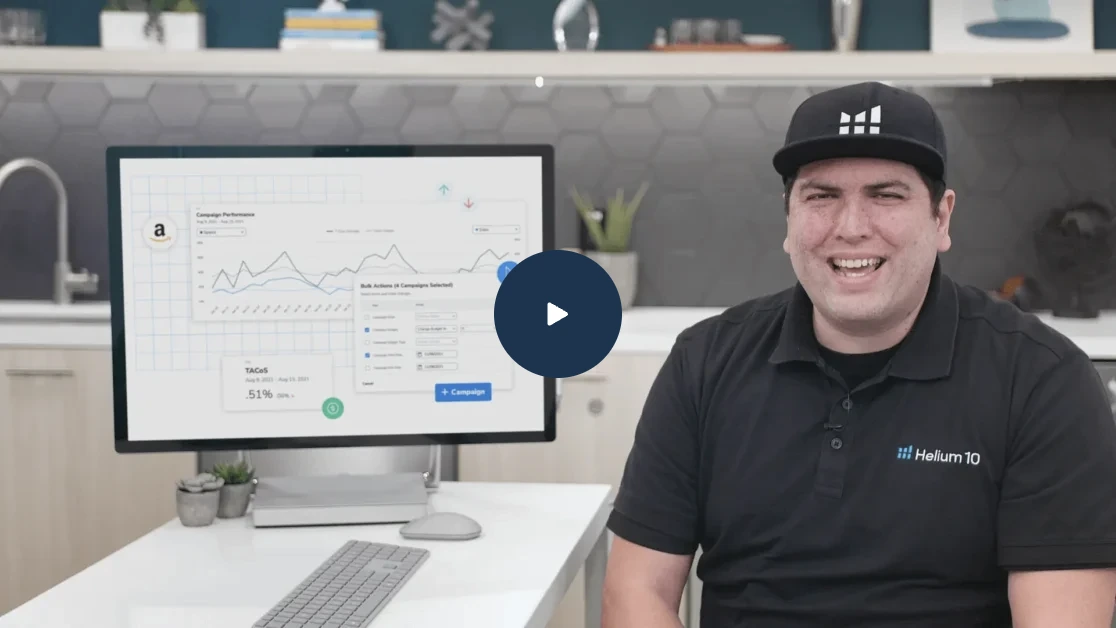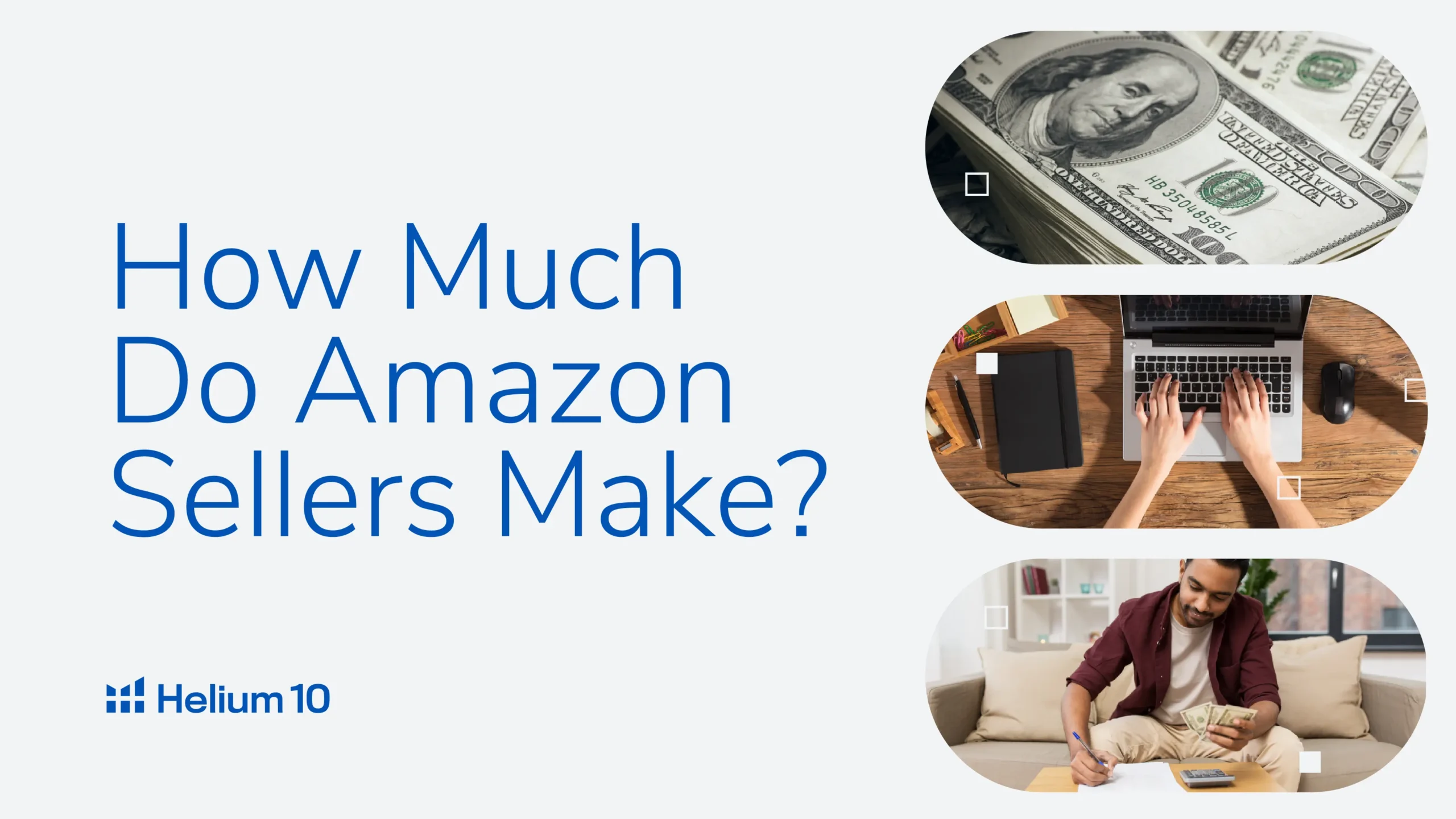
How Much Do Amazon Sellers Make in 2024?


Table of Contents
- Introduction
- How Much Do Amazon Sellers Make?
- What Is the Average Monthly Sales for Amazon Sellers?
- How Much Does Amazon Take from Sellers?
- What Is the Typical Profit Margin for Amazon Sellers?
- Is Selling on Amazon Still Profitable?
- How Long Does It Take To Become Profitable?
- How Much Do You Need to Start Selling on Amazon?
- How to Get Started Selling on Amazon
- Conclusion
Introduction
Selling on Amazon is an incredible opportunity that many people have taken advantage of over the past 20 years. It is a business opportunity that really leaves whether or not you are successful up to you. Most people want to know how much they can make as an Amazon seller—especially if they choose to sell one of the best selling items on Amazon—and the true answer to that is that you can make as much as you want to as an Amazon seller. The biggest thing you need to understand is that this is a business and, while you can make passive income on Amazon, it is uncommon. Selling on Amazon is hard work and there will be lots of challenges and failures along the way. The way you deal with the challenges and failures will separate you from those who profit and those who don’t profit on Amazon. It is also important to learn as much as you can about selling before you start and be a continuous student, always learning how to grow and optimize your business. If you are determined to be a successful Amazon seller, you have the opportunity to embark on a very potentially profitable journey!

Outclass Your Competitors
Achieve More Results in Less Time
Maximize your results and drive success faster with Helium 10’s full suite of Amazon and Walmart solutions.
Sign Up for Free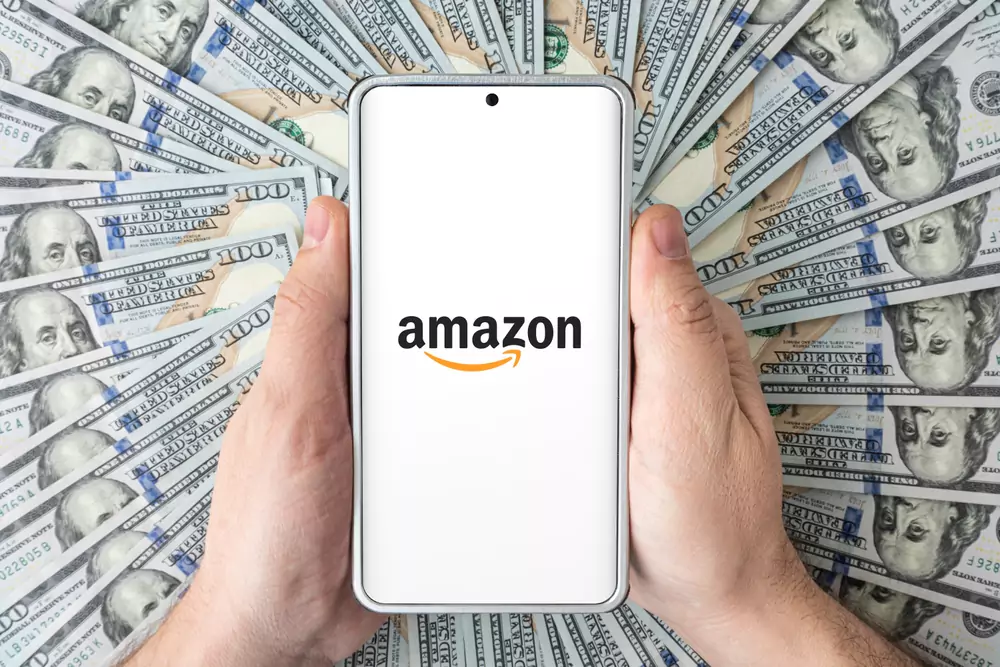
How Much Do Amazon Sellers Make?
If you want to know whether or not selling products on Amazon—or even learning how to sell on TikTok shop—can be a profitable and lucrative business, the answer is definitely yes! However, the amount of money Amazon sellers make can vary greatly depending on various factors such as the type of products they sell, the amount of capital a seller has to invest in new products to sell, their pricing strategy, their marketing efforts, the competitiveness of their niche, profit margins and their operational efficiency. Some Amazon sellers make only a modest income, while others generate substantial income and profits.
Like any type of business, Amazon sellers usually get out of the business what they put into it. Some sellers might be selling part-time and might only make a few hundred or a few thousand dollars a month while other sellers make millions every month. Individual results vary quite a bit just like any business, although there are some high-demand products to start selling that may help you find rapid success. For example, when I started selling on Amazon, I made around $200 dollars in sales per month. That has grown now to $200,000 plus sales per month. The amount you can make on a monthly basis will vary quite a bit based on your experience and how you have marketed your products and brand on Amazon.
Something to note is that if a seller sells thousands or millions of dollars per month on Amazon, that doesn’t always equate to profit. Some sellers might be selling millions and just barely break even or have very little profit. This is because there are also costs involved with being a seller that needs to be considered to stay profitable. Amazon charges a referral fee which is a different percentage for each category. They also charge different Amazon FBA seller fees depending on whether you utilize their services to pick, pack, and ship your products. There is also the initial cost of the product manufacturing and shipping to the Amazon warehouses. Last but not least, there is also a cost to market a product on Amazon whether that is through Pay Per Click (Amazon PPC) advertising, social media marketing, or other methods of marketing.
The main thing that anyone who is interested in selling on Amazon needs to do is consider selling on Amazon as a business. It is not passive income but a business opportunity and if you think of it that way, there is definitely a possibility of becoming a very successful Amazon seller.
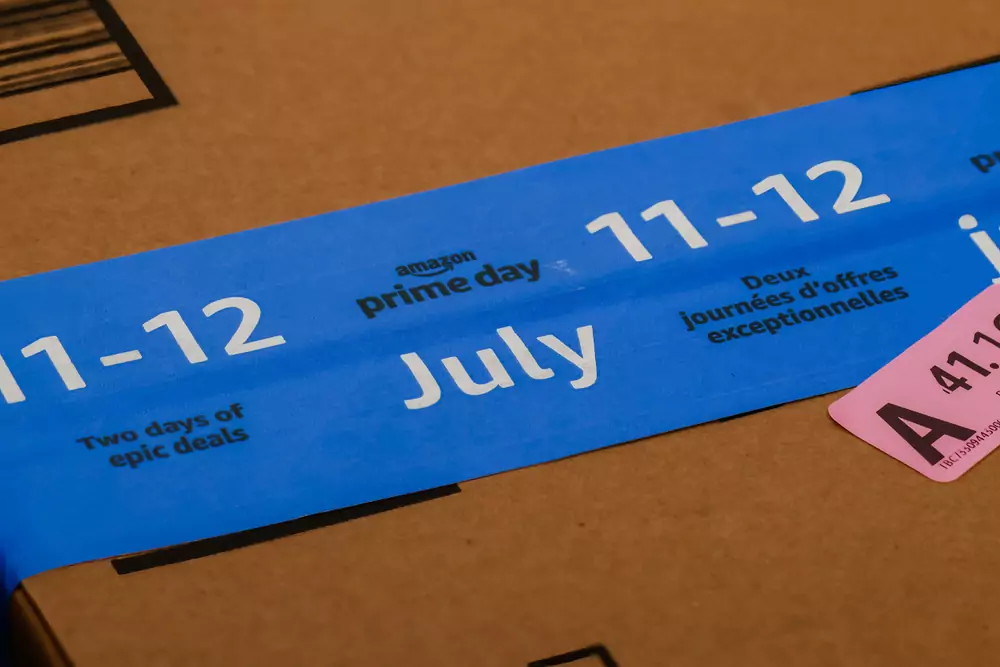
What Is the Average Monthly Sales for Amazon Sellers?
Selling on Amazon can be a highly profitable venture, surpassing the average side hustle. But how much do Amazon sellers really make?
- Most Amazon sellers generate at least $1,000 per month in sales
- Super-sellers can earn over $100,000 per month
- 40% of sellers fall within the $1,000-$25,000 monthly sales range, translating to $12,000-$300,000 annually
Additionally, Amazon seller earnings statistics reveal:
- 19% of sellers generate over $10,000 in monthly sales
- 30% report sales exceeding $5,000/month
- 31% of new sellers start with under $500/month in sales but have room to grow
How Much Does Amazon Take from Sellers?
Amazon has a few different fees such as the referral fee, storage fees, and fulfillment fees. The referral fee is a percentage of the total sales price, including the item price, shipping charges, and any gift wrap fees, excluding taxes collected through Amazon tax collection services. The referral fee percentage varies by category, ranging from 6% to 45%, with most categories falling between 8% and 15%.
For sellers who use Fulfillment by Amazon (FBA) to store, pick, pack, and ship their products, there are fulfillment fees involved, which vary based on the size and weight of the item.
It’s important to note that these fees can change over time, so sellers should regularly check Amazon’s fee schedule for the most up-to-date information. Additionally, sellers should consider these fees when pricing their products and calculating their profitability on the platform.
What Is the Typical Profit Margin for Amazon Sellers?
The profit margin for an Amazon seller varies significantly based on several factors. These factors include the category of the product being sold, the level of competition in the market, the seller’s pricing strategy, their cost structure, and their operational efficiency. Generally, profit margins on Amazon can range from single-digit percentages to over 30%, depending on these variables. Key determinants of profit margins include the cost of sourcing or manufacturing the product, the selling price set by the seller, Amazon’s fees such as referral fees and fulfillment fees (if using FBA), marketing and advertising expenses, operational costs like shipping and storage, and return rates. Successful sellers focus on managing these factors effectively to maximize their profit margins. They carefully monitor expenses, optimize pricing strategies, control costs, and continuously seek to improve operational efficiency to maintain healthy profitability on Amazon.
Helium 10 has created an Amazing tool called the FBA Calculator that allows sellers to calculate potential profit using referral fees and fulfillment fees of a similar product on Amazon. All you need to do is first go to the Amazon page of a similar product and pull the Helium 10 Chrome Extension. Once you have pulled up the Chrome Extension, click on “Profitability Calculator” and fill in the information as accurately as possible to get a good idea of how profitable the product you want to sell will be.
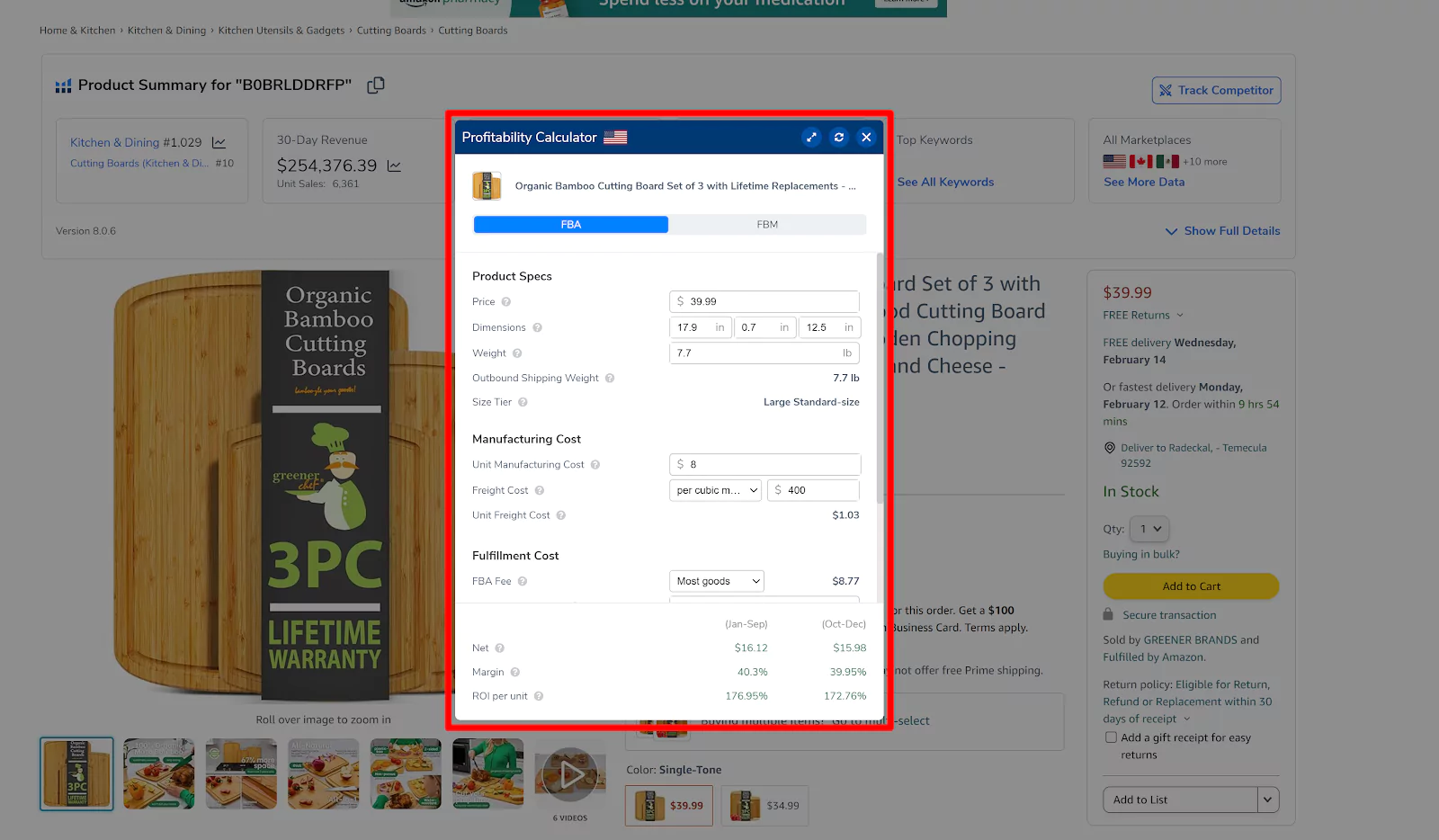
Is Selling on Amazon Still Profitable?
Selling on Amazon continues to offer profitable opportunities for many sellers, contingent upon several factors. In order to stay profitable, sellers need to calculate potential profit taking into consideration Amazon’s referral fees, FBA fees, storage fees, advertising expenses, etc along with the cost to manufacture and ship the products you are selling. Profitability on Amazon really varies from seller to seller based on their ability to find products with higher profit margins and calculate potential profit margins accurately. So, is selling on Amazon FBA worth it? As a seller who is currently profitable on Amazon, I would say it definitely is still worth it and it is still profitable in 2024.
How Long Does It Take To Become Profitable?
Profitability is extremely important to consider when selling on Amazon and when a product or brand starts to profit can vary quite a bit based on product offerings and strategy. The timeline for achieving profitability as an Amazon seller can vary significantly depending on factors such as the type of products being sold, the competitiveness of the market, the seller’s marketing efforts, and their ability to operate efficiently in areas such as fast fulfillment of products. Some sellers may start generating profits relatively quickly, while others may take longer to reach profitability.
For some sellers, profitability can be achieved within the first few months of starting their Amazon business, especially if they offer unique products with high demand and minimal competition. However, it’s important to consider factors such as initial investment, product sourcing costs, Amazon fees, advertising expenses, and other overhead costs, which can impact the timeline for profitability.
Some sellers may take longer to become profitable, especially if they are operating in highly competitive markets or selling products with lower profit margins. These sellers may need to invest more time and resources into product research, marketing strategies, and optimization to start generating consistent profits.
There is no one-size-fits-all answer to how long it takes to profit on Amazon. Success as an Amazon seller requires careful planning, persistence, continuous optimization, and adaptation to the market. Some sellers may achieve profitability relatively quickly, while others may need to be patient and persistent in their efforts to build a successful and profitable Amazon business over time.
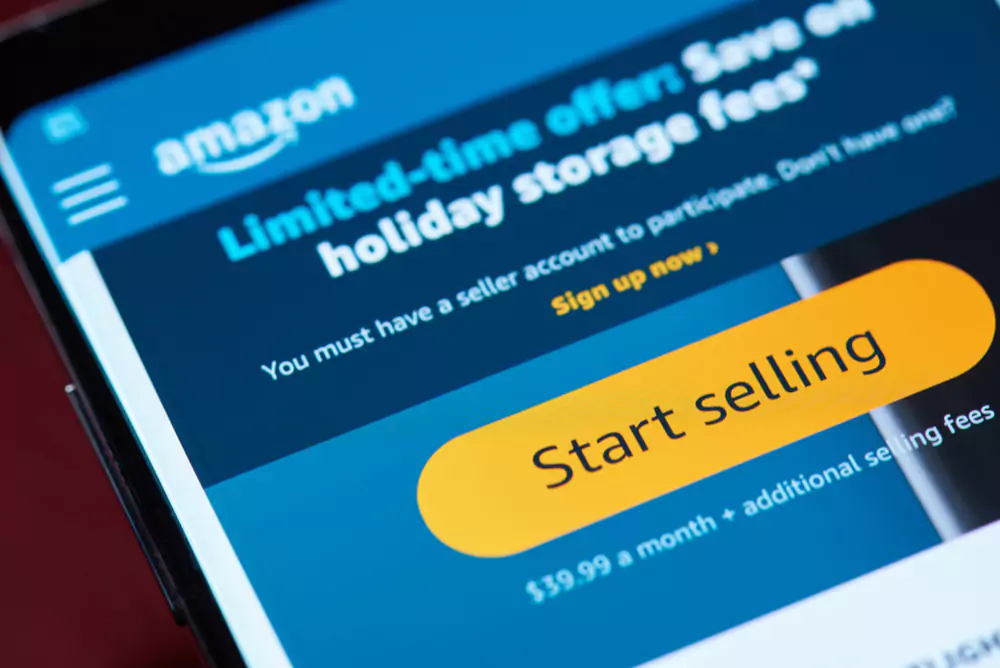
How Much Do You Need to Start Selling on Amazon?
There are a few ways that you can start selling on Amazon and each method requires a different amount of capital. For example, you can start by selling retail arbitrage and invest as little as $100 to get started. The Retail Arbitrage method is where you go out to local stores and buy products that you can flip on Amazon. For example, one seller that I know who started selling Retail Arbitrage found a product at Target that was sold for $10 per unit and he sold that same unit for $40-$50 on Amazon. He ended up making around $100,000 in sales per month just buying this one product from Target and flipping it on Amazon. He started out with very little capital and was able to gradually make a huge profit. Then, with the profit he made from selling Retail Arbitrage, he invested into a Private Label Brand where he has started selling exponentially more every month.
Another method of selling is Amazon Wholesale. With wholesale, you contact brands and wholesale suppliers directly and get permission to sell their products on Amazon. Then, they give you a wholesale price and you can go to Amazon and other platforms such as Walmart, and sell wholesale products for a profit. You can start selling wholesale with just a few hundred to $1000 dollars and you can keep building your capital as you sell more.
The last way is to sell Private Label. This is basically where you create your own brand and product and get it manufactured. Most sellers get their products manufactured through Alibaba.com when they are starting out. For this method, you will want to have at least $10,000 which is on the low end. To have a more comfortable product launch, $20,000 will be a better amount to start with when selling on Amazon. The reason for this is that you need to get your product manufactured, pay for shipping, pay import taxes, and then pay to market the product. You also need to make sure to have enough inventory to last you the first few months of selling because if you run out of stock on Amazon, your rank will plummet and all of your marketing efforts will be for nothing.
Overall, if you have a smaller budget, start out selling Retail Arbitrage and Wholesale until you can build the capital to start selling your own private label. If you have the capital to get started with Private Label, you can go ahead and get started selling your own brand and products.
How to Get Started Selling on Amazon
To get started selling on Amazon, the best way to start is to learn and get educated on how to find a product to sell. Helium 10 has an incredible product research tool called BlackBox. If you want to know strategies on how to find winning products, check out this BlackBox Product Research Masterclass. You will want to look for products that are in high demand with lower competition using the strategies in the above class. Then you will want to use the FBA Calculator located in the FREE Helium 10 Chrome Extension to calculate potential profitability.
The next thing you will want to do is decide how you’ll source your products. Options include manufacturing your own products, wholesaling from suppliers, or selling existing branded products through retail arbitrage. If you want more information on how to sell on Amazon, check out Freedom Ticket, which is Helium 10’s course on how to sell on Amazon. It is free with any Helium 10 subscription and has won awards such as the Best FBA course! Utilizing this course instead of paying for other courses out there will allow you to put more money towards your business and you will be getting the best information on how to sell on Amazon.
Once you have found your product to sell and you have decided on the method you want to use to sell products, you will want to create an Amazon Seller Account on Amazon Seller Central. You will need to choose between an Individual or Professional selling plan based on your business goals. The professional plan offers additional features and has a low subscription fee of $39.99 per month.
Once you have sourced your product, you will need to create a product listing for your product. Include optimized product titles, detailed descriptions, high-quality images, and relevant keywords to optimize visibility and attract potential customers. Luckily, this can be easily done using our powerful Magnet which quickly finds a huge quantity of useful keywords. Familiarize yourself with Amazon’s listing guidelines and policies to ensure compliance.
When your listing is up and running on Amazon, you will need to launch your products by starting Pay Per Click advertising and other launch strategies. Utilize Amazon Advertising tools such as Sponsored Products and Sponsored Brands to increase visibility and reach your target audience. Leverage social media, email marketing, and other channels to promote your products outside of Amazon.
Once you are selling products, you will want to focus on managing your account. You will want to monitor your Amazon seller account regularly to track sales, inventory levels, and customer feedback using our handy Profits tool. Provide excellent customer service by promptly addressing inquiries, processing orders efficiently, and resolving any issues that may arise. Maintain inventory levels to prevent stockouts and ensure timely order fulfillment.
Continuously optimize your Amazon listings, pricing strategies, and marketing efforts based on performance data and customer feedback. Stay informed about industry trends and best practices to remain competitive and adapt to changes in the e-commerce landscape.
Additionally, if you want to optimize your listings much easier, check out our intuitive Listing Builder tool that many serious sellers use daily to beat the competition.
By following these steps and remaining proactive in managing your Amazon business, you can establish a successful presence on the platform and capitalize on its vast marketplace opportunities.
Conclusion
Selling on Amazon offers immense potential for profitability, but success requires careful planning, diligent execution, and ongoing adaptation. By understanding Amazon’s fee structure and implementing effective marketing tactics, sellers can maximize their profitability and navigate the competitive landscape successfully. While the journey to success may vary for each seller, one thing remains constant: with dedication, persistence, and the right strategies in place, anyone can thrive as an Amazon seller. So, as you embark on your Amazon selling journey, remember to stay informed, stay proactive, and most importantly, stay committed to achieving your goals.
Achieve More Results in Less Time
Accelerate the Growth of Your Business, Brand or Agency
Maximize your results and drive success faster with Helium 10’s full suite of Amazon and Walmart solutions.
